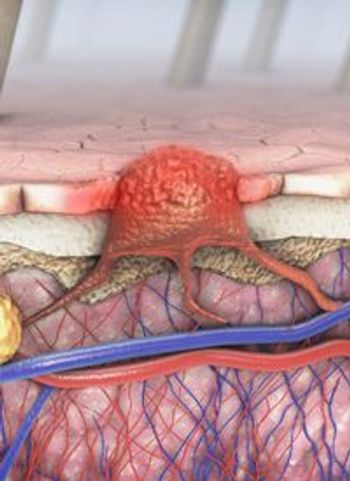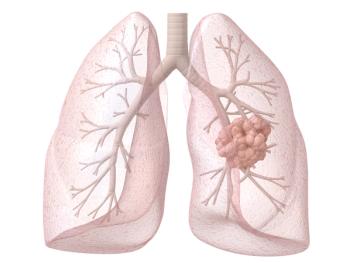
A single-arm phase 2 study assessed local consolidative therapy regimens in patients with oligometastatic stage IV non–small cell lung carcinoma.

Your AI-Trained Oncology Knowledge Connection!


A single-arm phase 2 study assessed local consolidative therapy regimens in patients with oligometastatic stage IV non–small cell lung carcinoma.

Of note, lung cancer incidence was higher among women younger than 65 compared with their male counterparts in 2021.

Patients who received the isatuximab combination in the IMROZ trial experienced prolonged MRD-negativity, which correlated with improved PFS.

In considering patients’ busy lives, AI may help reduce the number of visits required to fully stage and grade cancers.

Doxycycline/minocycline, clindamycin, chlorhexidine, and a ceramides-based noncomedogenic moisturizer reduced skin- and nail-related AEs in NSCLC.

Additionally, adding nab-paclitaxel to gemcitabine/cisplatin confers more toxicity than gemcitabine/cisplatin alone in the phase 3 SWOG S1815 trial.

Everolimus plus lanreotide elicited a PFS of 29.7 months compared with 11.5 months from everolimus monotherapy in patients with gastroenteropancreatic neuroendocrine tumors.

Acalabrutinib improves efficacy in high-risk patients like those with TP53 mutations, those with complex cytogenetics, and those with high proliferative rates in MCL.

Sessions of interest at the 2025 Gastrointestinal Cancers Symposium will include data on colorectal cancer, pancreatic ductal adenocarcinoma, and more.

RP1 with nivolumab elicited an ORR of 38.7% with an acceptable safety profile in patients with advanced melanoma who progressed on anti–PD-1 therapy.

Results from a Chinese phase 1 trial reveal that anlotinib plus EGFR-TKIs demonstrated manageable toxicity in NSCLC pre-treated with EGFR-TKIs.

Tycel Phillips, MD, questioned how the regimen of acalabrutinib, bendamustine, and rituximab would compare with taking the drugs separately in mantle cell lymphoma.

Standardizing surgical outcomes and better training oncologic surgeons may be accomplished through the use of AI.

The approval marks Foundation Medicine’s first companion diagnostic indication to exclusively support pediatric patients with brain tumors.

Dostarlimab/chemotherapy elicited a 31% decrease in the risk of death compared with placebo/chemotherapy in locally advanced/recurrent endometrial cancer.

Micheal P. Bogenschutz, MD, discussed addressing unmet needs, implementation, and adverse effects related to psilocybin-assisted psychotherapy in cancer.

Michael P. Bogenschutz, MD, discusses the efficacy, safety, implementation, and future research of psilocybin for cancer-related psychological events.

The poly-ICLC trial seeks to develop a delivery mechanism to prostate cancer through different biomarkers.

Progression-free survival and objective response rate outcomes favored the tisotumab vedotin arm in the China subpopulation of the innovaTV 301 study.

The DCISionRT test has shown to be a significant factor in a clinician’s recommendation on whether a patient with DCIS should receive radiotherapy.

UGN-102 elicited complete responses in 79.6% of patients with non–muscle-invasive bladder cancer at 3 months in the ENVISION trial.

A panel of experts met to discuss the best treatment options for patients with EGFR or TP53-mutated non–small cell lung cancer.

As part of a Satellite Sessions program focused on the Cleveland Clinic and surrounding institutions, CancerNetwork hosted a panel discussion on treatment options for patients with EGFR-mutated NSCLC.

The discussion on NSCLC narrowed in on findings from recent clinical trials, particularly involving a combination regimen of amivantamab plus lazertinib vs osimertinib and chemotherapy.

Referring to the NCCN guidelines for the treatment of EGFR-mutated NSCLC will help clinicians determine which treatments are best recommended.

The combination of amivantamab plus lazertinib has emerged as a potential treatment option for patients with EGFR-mutated NSCLC and has shown sufficient efficacy responses.

Shwetal Mehta, PhD, highlights early phase clinical trials, biomarker testing strategies, and potential next steps for research in the brain cancer field.

Interim analysis data show improvements in overall survival with OST-HER2 in this osteosarcoma population compared with historical controls.

Data from the TROPION-Breast01 trial support the FDA approval of datopotamab deruxtecan for those with metastatic HR–positive, HER2-negative breast cancer.

“Some of the early data that came out of the [ECHO] trial that led to this approval does suggest that it may be beneficial in some high-risk patients,” Tycel Phillips, MD, said.